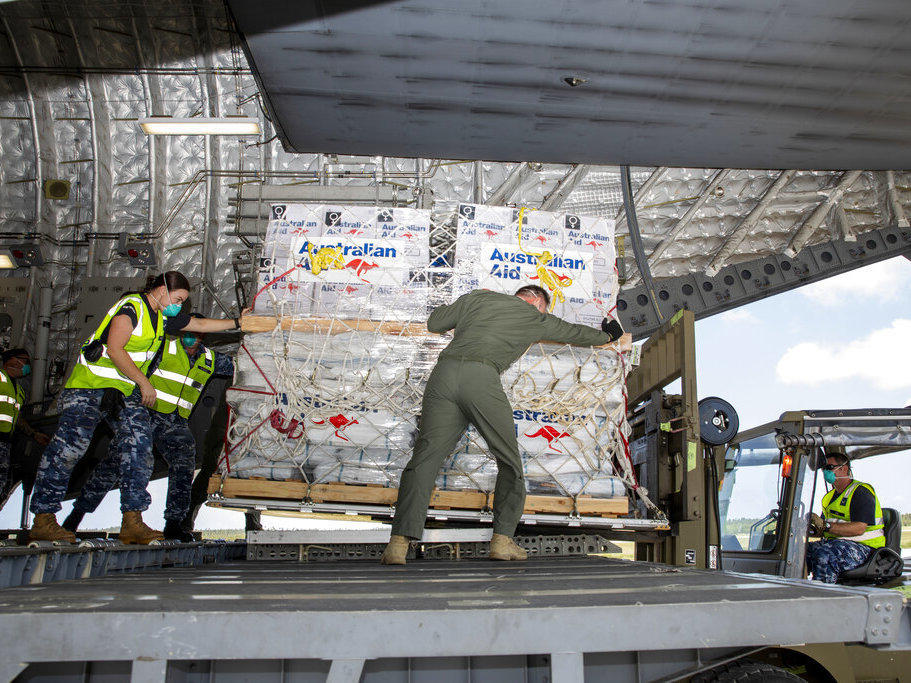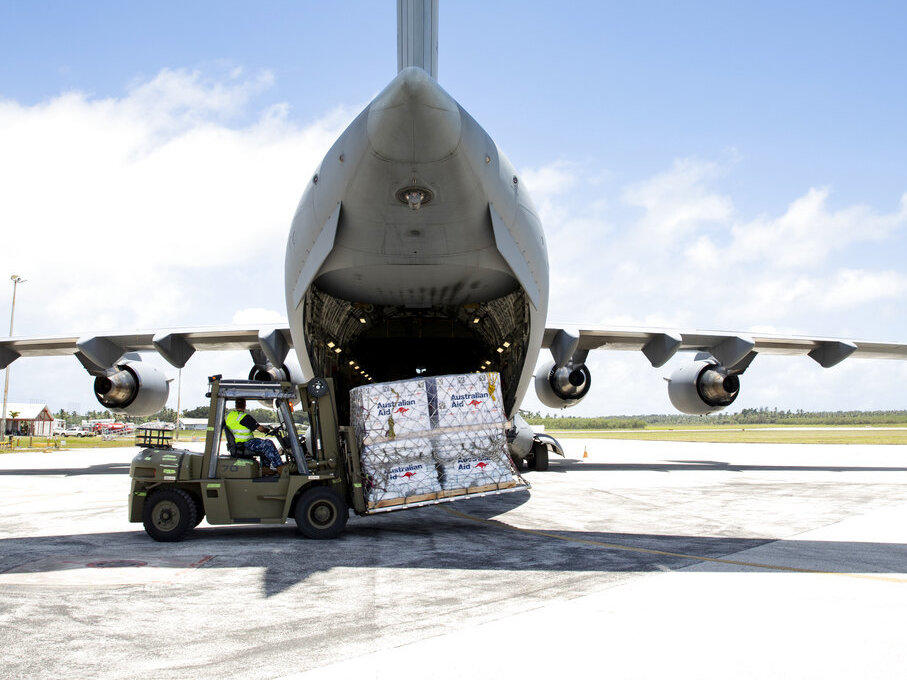Section Branding
Header Content
Dozens of former guests are rallying to save a Tonga resort
Primary Content
WELLINGTON, New Zealand — The tranquil resort in Tonga sat behind a lagoon and reef break that was perfect for snorkelers and surfers alike. Guests who had never met before would sit together to eat delicious communal meals cooked by owner Moana Paea and her staff, or relax in rustic cabins tucked in the trees.
Then came the massive volcanic eruption and tsunami, which killed at least three people and left dozens more homeless. The waves swallowed up the Ha'atafu Beach Resort.
"It's completely bare land. Coupled with the black ash from the volcano, it looks like a bomb site," said Paea's brother Alan Burling after viewing images online.
But now, dozens of former guests from New Zealand, Australia, the U.S. and elsewhere are raising money to help Paea and her husband Hola start again.
It's just one of the ways the world is rallying to help the people of the remote Pacific island nation rebuild. Governments from New Zealand, Australia, Japan, Britain, China and elsewhere have been sending fresh water and other much-needed supplies on military ships and transport planes.
Pita Taufatofua, who became a sensation as Tonga's bare-chested Olympic Games flag bearer, has started an online fundraising page to rebuild schools and hospitals that is already more than halfway to its goal of raising 1 million Australian dollars ($720,000).
Tonga never had the luxury resorts of other Pacific destinations like Fiji or Tahiti, and tourists came expecting a more down-to-earth experience. At the Ha'atafu Beach Resort, the pandemic had already halted international tourism, and so the owners had pivoted to their renowned cooking.
New Zealand's acting high commissioner in Tonga, Peter Lund, was picking up some catering there on Saturday when the volcano erupted. Speaking by satellite phone from Tonga on Friday, he described what happened.
"It's all a bit of a daze now, but I certainly heard this incredible thunderclap," Lund said. He said the resort staff told him it was too dangerous to stay and so he returned to his car.
"The waves were coming in. I got back onto the main road," Lund said. "And gradually the skies turned black and the volcanic ash started raining down."
Lund's 30-minute drive back to the high commission in the capital, Nuku'alofa, turned into 90 minutes. Because the compound was built on higher ground, Tongans rushed to safety there and that night Lund had about 80 people stay.
Back at the beach resort, Moana Paea, her family and the others there had no time to save any of their belongings and ended up climbing a tree to survive, said Burling, who lives in New Zealand.
"Like everyone else, she was very upset and very emotional," he said after managing to speak to his sister briefly by phone.
He said he hadn't yet told her about the online fundraising page he started, which has already exceeded its goal of 100,000 New Zealand dollars ($67,000).
"Moana, she doesn't really like the fuss, and probably wouldn't have wanted us to raise the money," Burling said. "But she would have literally lost everything, and they have staff to support."
He said the resort had about 14 cabins, or fale, and could house 30 or 40 guests. It's too early to know whether they will rebuild. One worry is that the volcano could erupt again. The first priority, Burling said, is to send his sister a big box of clothes and other basic supplies.
People who have been donating money have been leaving messages online.
"Lovely memories of two wonderful family holidays at Ha'atafu with truly beautiful people," wrote one couple. "We are so saddened to hear of the devastation but incredibly glad to hear everyone is safe."
Elsewhere on the main island of Tongatapu, people are beginning the task of cleaning up. U.N. humanitarian officials report that about 84,000 people — 80% of Tonga's population — have been impacted by the volcano's eruption.
The tsunami severed the single fiber-optic cable that connects Tonga to the rest of the world, leaving many unable to connect with loved ones abroad to let them know they were okay.
At the Tonga Red Cross Society, Secretary General Sione Taumoefolau said they had two satellite phones, and families were invited to come in and use them. They were allocated three minutes each to speak with relatives abroad.
"Everyone was crying, it was very emotional," Taumoefolau said. "We've done 300 calls in just the last two days."
Some patchy phone service is slowly returning thanks to satellite links but the internet remains down.
"Everyone misses the internet, they're going crazy for the internet," Taumoefolau said.
The internet outage was stopping people from connecting with each other and meant many were unable to work.
People have been busy cleaning the ash from their homes. They usually rely on rainwater to drink, but with it tainted by ash Taumoefolau said the Red Cross was handing out cans of water or encouraging people to use the city supply.
He said they needed a big rainfall to wash away the ash, but it has been dry since the eruption of the Hunga Tonga Hunga Ha'apai volcano.
A New Zealand navy ship arrived in Tonga on Friday carrying 250,000 liters (66,000 gallons) of water and with a desalination plant that can produce tens of thousands of liters of fresh water each day.
Another ship left Australia with supplies, while Britain was diverting a Royal Navy ship. Japan had sent military planes and a ship was on the way.
"People are still coming to terms with everything. People I think are a lot calmer now than they would have been a few days ago," said Lund, the acting high commissioner. "The fact that the volcano has kept quiet I think has helped people feel a bit less anxious."
The gradual restoration of communications was helping, he said, as was the fact that Tongan officials were able to reach some of the hard-hit outer islands and evacuate or check in with residents there.
"So," Lund said, "progress."
Copyright 2022 NPR. To see more, visit https://www.npr.org.


